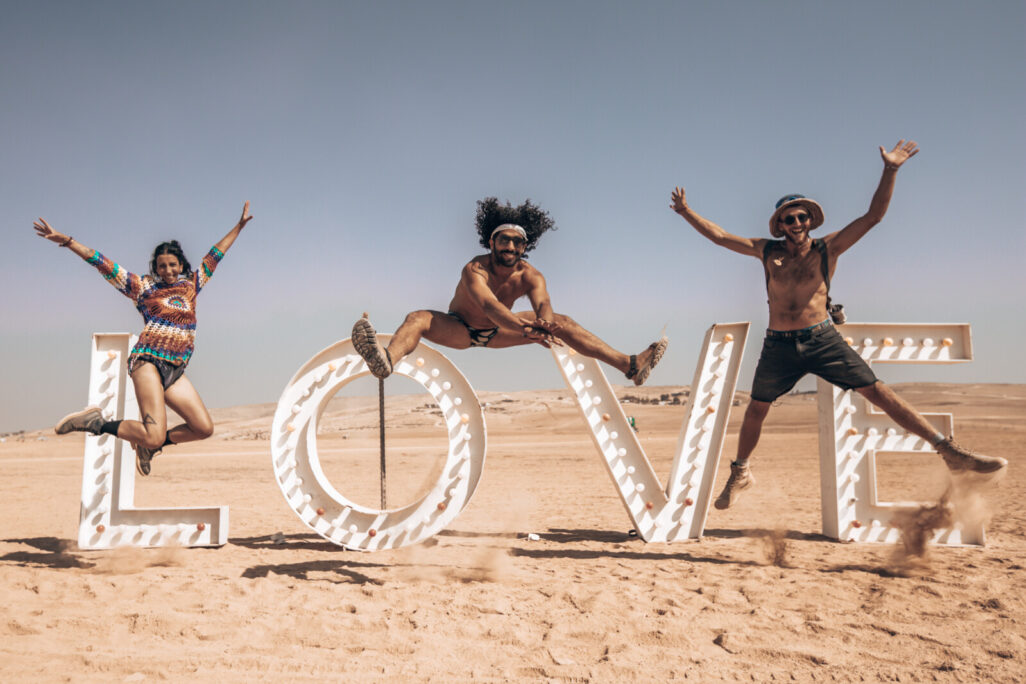
During the holiday of Sukkot – which celebrates temporality through its traditions of building makeshift dwellings and connecting with nature – the temporary city of Midburn rose once again in the heart of the Negev desert, full of colorful and creative art displays. About 7,500 residents dwelt in and operated it for six days, after which it disappeared as if never there, at least until next time. Re’em Shmuelevich, who published the book 'Midburn: Yetzer Ha’Tov [The Good Intention]' this month, believes the festival is not only an artistic space or a unique adventure, but also a meaningful social experiment.
Shmuelevich sees Midburn as a laboratory for examining how a society might function if money did not play a role and people worked and created out of a desire to give, to express themselves, and to build community.
Midburn (a portmanteau of the Hebrew word midbar, meaning desert, and the English word burn) is the Israeli version of ‘Burning Man,’ a festival which began in the 1980s and is held every year in the Black Rock Desert in northern Nevada. While the American event now encompasses over 80,000 participants, the Israeli version is more modest. In 2018, the event's best-attended year to date, approximately 12,000 people participated. Demand for tickets consistently exceeds the supply, which is limited mainly due to logistical and regulatory restrictions.
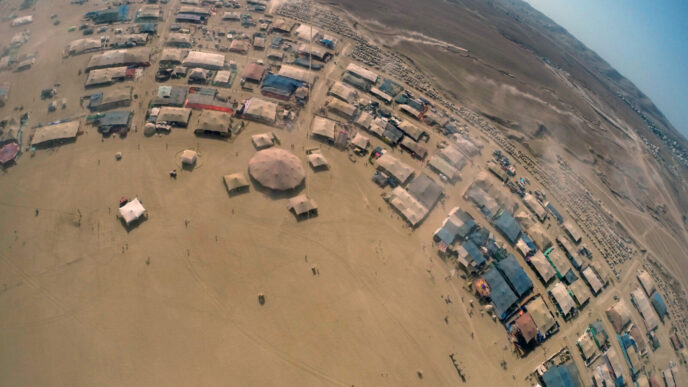
Although the event is packed with workshops, performances, parties, food, art exhibits and more, the community that has formed around it is not so enthused to call it a festival – they prefer the title 'temporary city.'
"You come to a festival as a consumer," explains Shmuelevich, who first became involved with the Midburn community in 2016. "You pay money to the festival organizers and they build the content for you that you consume. You usually also buy food on the spot and pay for services during the event. Saying that this is not a festival is meant to make it clear that this is something that you come to create, not to consume."
What makes the temporary city unique is that everything that happens in it is created by its inhabitants. Without their creation, it would consist only of a perimeter fence. Shmuelevich explains that the creative motivation comes from deep within the human soul.
"People who come to Midburn are looking for freedom. Freedom to be themselves, to create, to connect with each other. This absolute freedom can only be found in a world other than the one we are familiar with, which exists according to different principles."
Shmuelevich, 34, lives in Jaffa and works as a group facilitator, researcher and community organizer. He landed in the Midburn community almost by accident.
"After Midburn 2015, a friend of my brother told me that he spent a month doing hard physical labor to build a temporary city in the desert, and that he didn’t receive a single shekel for it. It intrigued me. A year later, when friends invited me to join them at the camp, I said yes."
While Shmuelevich admits that he was initially skeptical of the idea, he came to feel that the spirit of Midburn could be a source of inspiration for broader social initiatives, and from there his journey of exploration began.
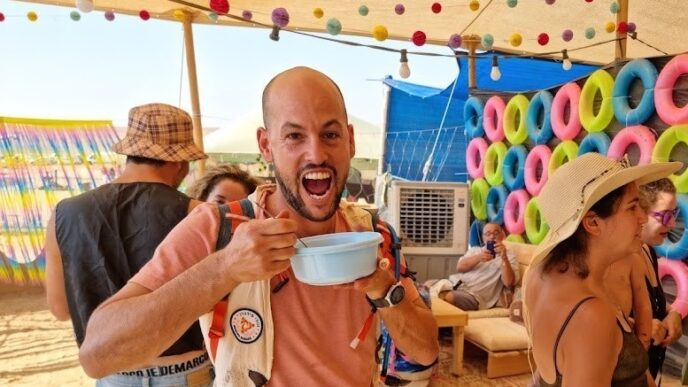
Performances, adventures, and one burning man
The temporary city of Midburn is built in the form of 270 degree arches, one inside the other, along which residents build various "camps" – accommodation and activity complexes with streets between them.
"Crossing it from side to side can take several hours. You walk the streets and around you are colorful people dressed in spectacular clothes during the day and glowing at night, most of them smiling. In each such camp you can do something different: an arcade machine complex, an active bar, a beauty salon where you can get your nails done, a karaoke complex. On the outskirts of the city there is also an area for members over the age of 18, with workshops for better communication in relationships and healthy sexuality, and a facility with communal showers for those who want to use them.
"In the center of the city there is a wide area known as 'The Playa,' where dozens of art displays are decorated with light bulbs and LEDs that shine at night. People walk around in groups, greet each other and give each other small gifts that they prepared ahead of time. At the center of the playa is the effigy, the icon of the event, a huge human statue dozens of meters high which is lit on fire on one of the last nights of the event."
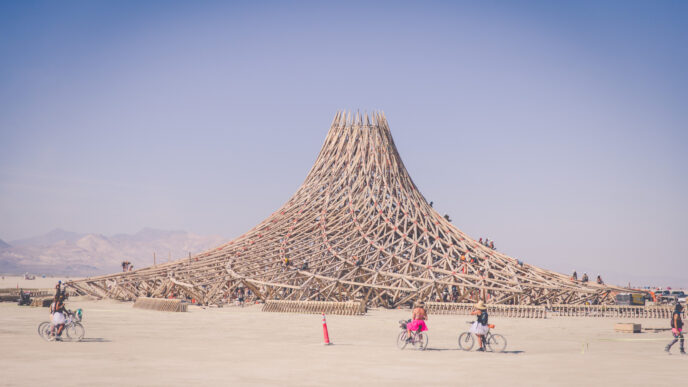
Temporality, according to Shmuelevich, is one of the basic principles of Midburn, and of the Burning Man culture in general. The principles were formulated by Burning Man founder Larry Harvey, and include: focus on the immediate, self-reliance, total inclusion (openness, and respect for others), participation, total self-expression, non-commercialism, gift giving, 'leaving no trace,' and civic responsibility – compliance with the law and full cooperation with the police and the authorities in every matter.
Giving gifts instead of making money
In his book, Shmuelevich claims that a different economy operates in the temporary city, one which he calls 'an instinctive economy' in which the motive for human activity is not money.
"Before the establishment of the city, tens of thousands of hours of work are put in by hundreds and hundreds of activists and volunteers," explains Shmuelevich. For example, the Midburn 2018 production team included over 400 activists who volunteered before the event, and another 2,500 activists who volunteered during the event in various roles.
"The work includes everything from building the infrastructure and putting it in place to coordinating between different departments, medicine and first aid, parking, fire control, which is a central component of the event, and physical and mental safety. Additionally, there are groups that organize to build some kind of art installation in the complex. Each of them offers the city some sort of 'gift.'"
This idea, according to Shmuelevich, is not new.
"It’s a mistake to think that economy and money are the same thing. Because throughout most of the human race's existence, the economy existed without money. Economy is the way in which humans create the conditions for their existence and share them. Two central aspects of any economy are production and the distribution of the fruits of production.
"In Midburn, one of the central ideas is gifting, an idea that can also be called a 'gift economy': people distribute goods, products and services to other people in an equal way and without compensation. The temporality of the city reduces the need to accumulate, and therefore also the material gaps between people. The main motivation to do anything is the pleasure you take from giving."
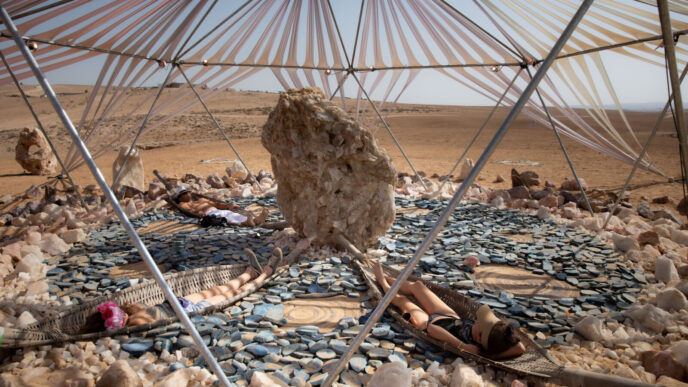
Shmuelevich sees Midburn as a different approach to the concept of "work."
"Midburn offers a revolutionary message that proves that work can be something filled with pleasure and not bound up in suffering. In modern society, most of our jobs are accompanied by a sense of alienation that prevents what we do from feeling like our own free, personal creation. We feel that our hours spent at work or in the office are not a way of expressing our unique essence.
"Work, construction and creation at Midburn are characterized by a reduction of this alienation: there are no employer-employee relationships, no one does anything for money. People can try new jobs, learn and make mistakes. It's not that all jobs are fun – some include washing dishes, hard physical labor, cleaning and more. But most of the work is done together in a group, and people are not measured according to their output. You do what you want to and choose to do, and no one forces you. That's why work, even when it's hard, becomes more playful and enjoyable."
An isolated bubble, or a model for change?
However, after six days, the temporary city is disassembled and all of its inhabitants return home to their regular jobs, complete with bosses and alienation. Does Midburn actually have the potential to change everyday life?
"The truth is, when I started writing the book, this was the biggest question that bothered me," Shmuelevich said. "The first time I arrived in the temporary city, I had a sense of cynicism that it was difficult to free myself from. I started my writing from a very critical position, but the more I dove into this culture and community – I realized that you can draw a lot of inspiration from it."
Shmuelevich compares Midburn to various books written throughout history that sought to describe utopias and visions of a reformed human society, such as Theodore Herzl's seminal 'Altneuland.'
"The power of these books was not that they changed reality directly, but that they allowed the development of the human imagination in relation to the possibility of a better society, and drew the outline of its image. I think that what’s special about Midburn is that it’s a real social experiment. In my opinion, the very existence of Midburn is an attempt to answer the question of how to create a society that allows the greatest amount of freedom for the greatest number of people."
Is it possible to manage the State of Israel according to Midburn's principles?
"It’s not a blueprint for Israeli society, but there is a statement here that touches on one of the fundamental questions of human society: the question of trust in human beings. Midburn and its gift economy prove that just as humans have a desire to take, to appropriate, to compete, to accumulate and to strengthen themselves, they also have the desire to create, give, share, to enrich and love others."
Freedom, personal expression, and community participation
As part of the preliminary research for the book, Shmuelevich conducted a survey among the members of the Midburn community and asked which of their desires were strengthened by their participation in the event.
"The survey revealed that the most significantly heightened desires were related to personal freedom and personal expression, reducing judgment and a greater willingness to act ‘according to the heart’ over social and economic constraints, even outside the temporary city. But alongside these, the survey revealed that cooperative desires have also strengthened, such as the desire to be part of a community, or active in a parents' or neighborhood committee.
"People also described the barriers they face in trying to realize these desires, chief among them the feeling that they lack partners, and the difficulties involved in changing their current lifestyle or adopting more cooperative lifestyle models."
As a youth movement graduate and a professional in the field of informal education, Shmuelevich says that Midburn feels to him a lot like an adult version of the youth movement summer camps he attended.
"It has many expressions of the informal code, of the comradeship, the love of human togetherness."
"A ticket costs over a thousand shekels, but no one profits from the event"
This year, the price of the ticket to Midburn was 1,140 shekels (US $320). This begs the question, doesn't this harm the principle of "radical inclusion" and the ability of a broad population to take part?
"The tickets for the event are really not cheap. But, you have to remember that this is an event produced by a non-profit organization which hires one employee throughout the year, and three more employees for the three months before the event. So most of the money from ticket sales is used for the expenses of holding the event itself: security arrangements, medical, fire fighting, licensing, and other expenses required by the state. This is a week-long mass event of thousands of people that carries with it costs, and there is no part of the organizational body that makes a profit from it."
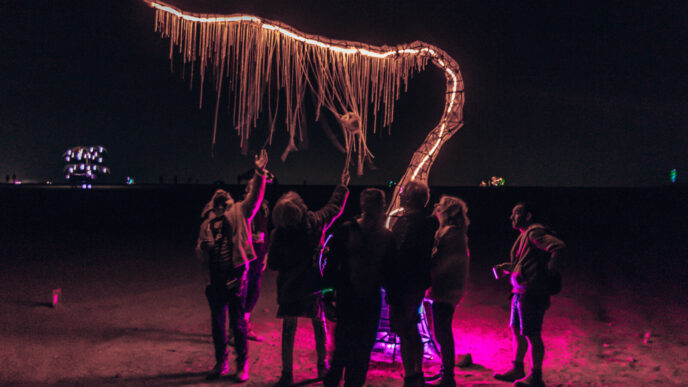
In 2018, for example, Midburn participants spent approximately 6.5 million shekels (US $1.83 million) on the purchase of tickets. However, if you account for the hundreds of thousands of hours of voluntary work by the participants and activists, it can be estimated that the cost of the event would have jumped to about 16 million shekels (US $4.5 million). In other words, the participants covered about 59% of the event’s actual cost through their labor.
In practice, the cost of the festival for participants is higher than the price of a ticket. The ticket only covers entrance into the city; participants are required to bring their own food and drink, or to organize in advance as part of a 'camp.' Each participant in Midburn can choose whether to join a camp, a group of about 30-150 participants who jointly arrange a sleeping area and facilities that will make their stay at the event pleasant, or to come with a tent and food and manage independently.
Participation in a camp can cost anywhere from hundreds to thousands of shekels. "There is no limit to the amount that the camps can charge," says Shmuelevich.
"At Burning Man in the USA, there’s been a development of camps on the fringes that charge huge sums and create luxury complexes within the city – but in Midburn this phenomenon doesn’t exist. At most there can be a difference in the quality of the food that different camps provide to their members or in other conditions such as toilets and showers."
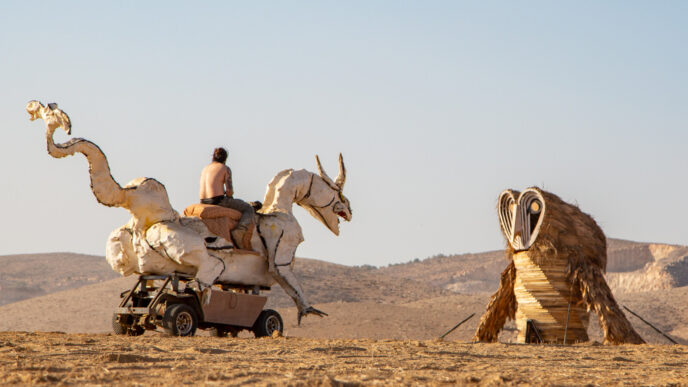
Shmuelevich points out that most of the money that the camps collect from their members is actually used to create their joint gift to the city, which is usually a service, premises, or food and drink that the camp freely offers to everyone who comes through its gates. For example, the camp that Shmuelevich is a member of provides the city with a 24/7 karaoke complex that includes sofas, a stage, screens, a projector, computers, and of course a DJ, speakers and homemade rum for anyone who needs it.
And yet, he agrees that there is a gap between the vision of an egalitarian and open society and its implementation in the accessibility of the event.
"You will not find all levels of Israeli society at this event. It is an event where most of the participants are from the middle class and above. Although there is a significant number of tickets that are allocated to people with low incomes at a reduced price."
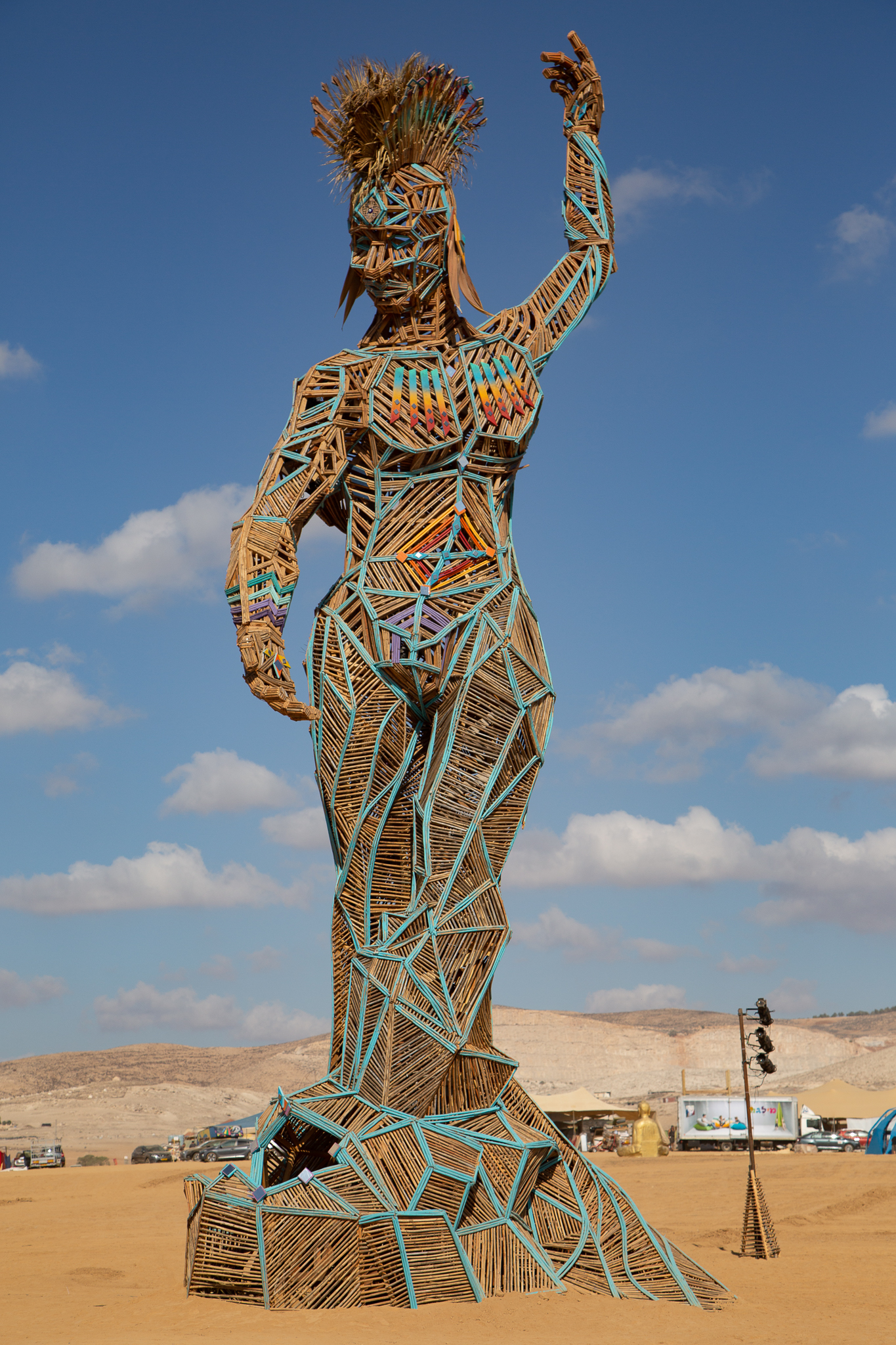
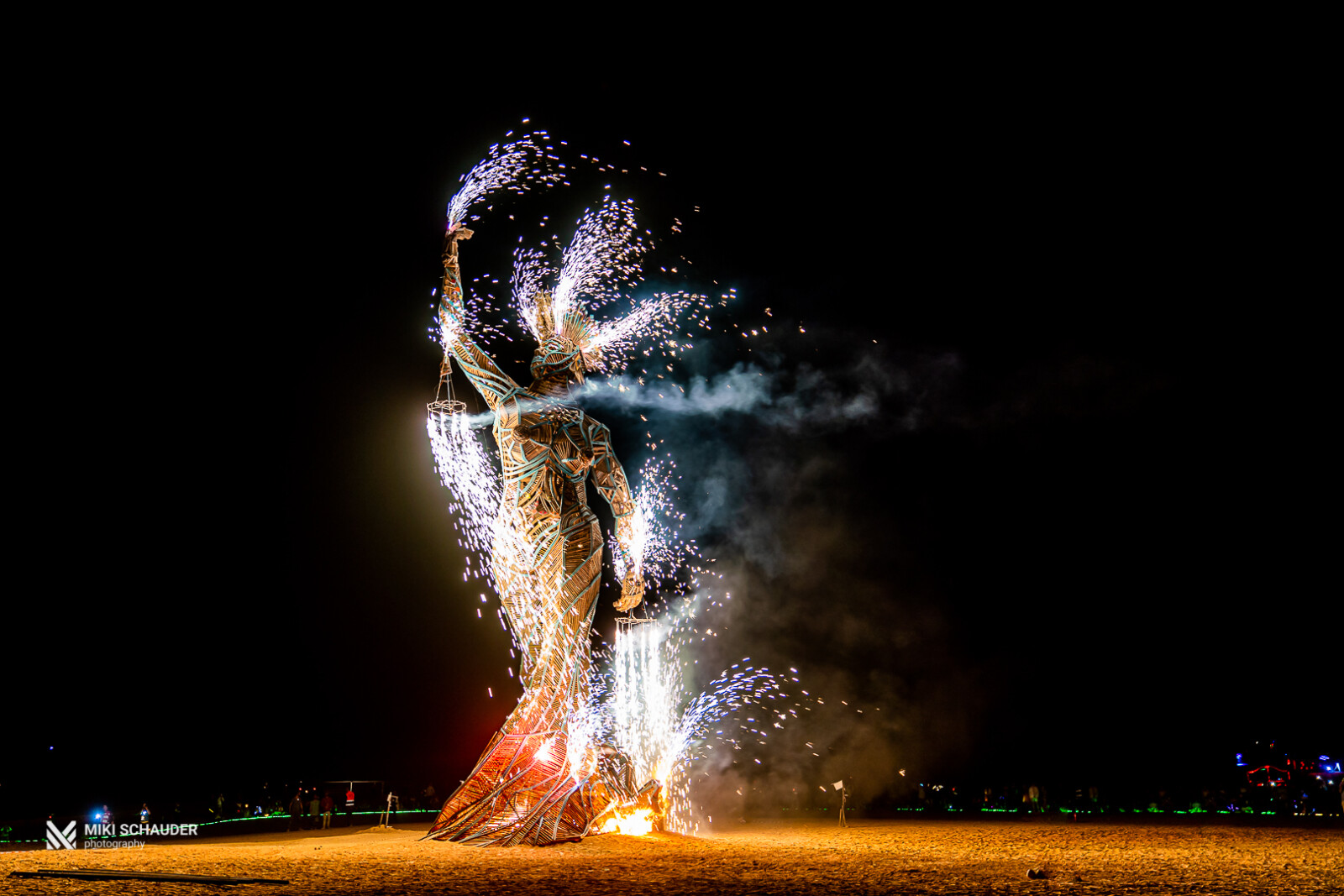
Shmuelevich points out another issue: "I think that there are broad populations who spend similar amounts of money on other entertainment. In the end, the cost of participating in Midburn is quite similar to the expenses of a short trip abroad, and you can have more experiences, attractions and sights there than a standard trip abroad."
According to him, it would be possible to reduce the costs of the event by recruiting commercial sponsorships, but this goes against the spirit of non-commercialism and self-reliance.
"These are principles that the community in Israel adheres to quite fanatically. There is a ban on the admission of marketing or advertising material to Midburn. The only thing that can be bought with money in the temporary city complex is ice. Even for the book I wrote about Midburn, I can’t promote it in Midburn community groups on Facebook, and I certainly can’t sell it at the event."
For Shmuelevich, Midburn challenges the basic premise of the current structure of society and economy, according to which people are fundamentally selfish creatures, interested in themselves and not in others.
"The book is an attempt to give words to the fact that Midburn is an experience that has value, and that there is something to learn from it: human beings are fundamentally good, and they just need the freedom to express that."
This article was translated from Hebrew by Hannah Blount.






